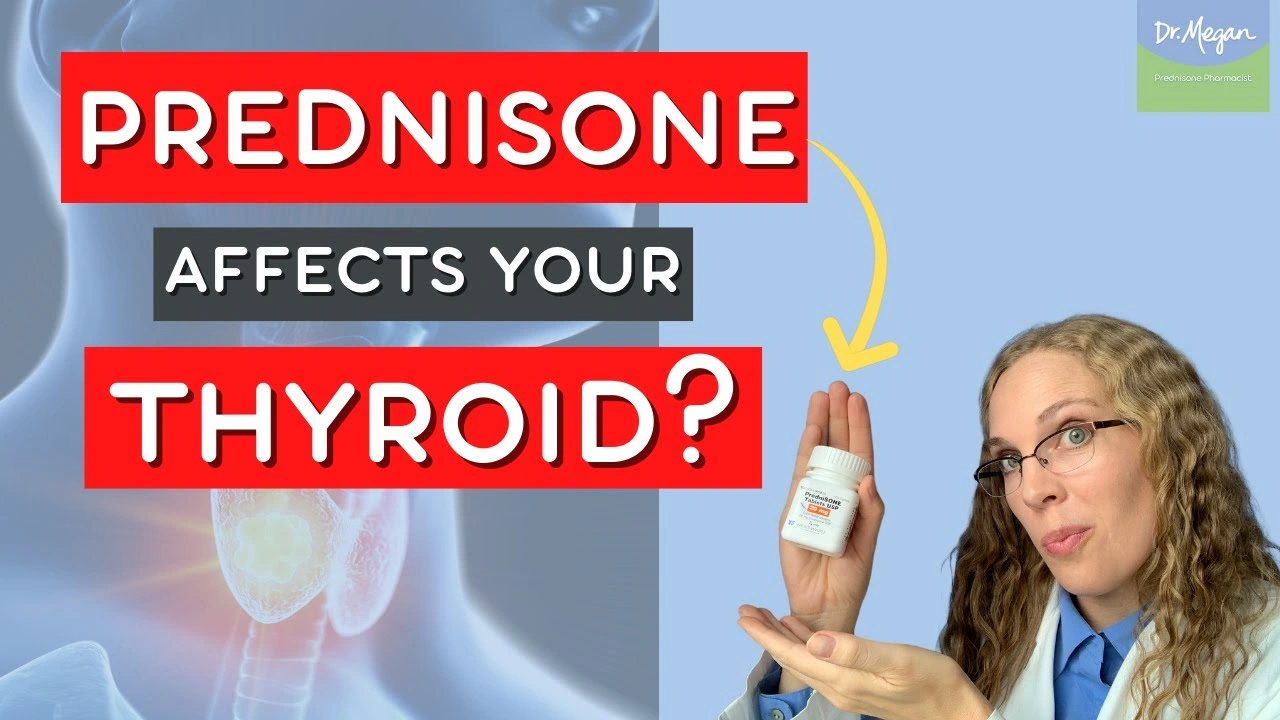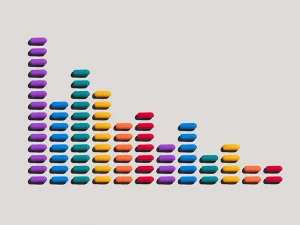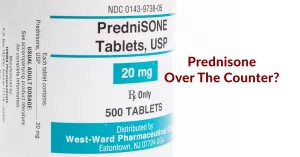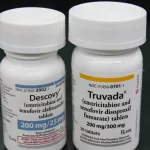
Wait — Your Meds Can Mess With That Test?
Let’s just dive right in: you’re juggling life, fitness, that never-ending to-do list, and maybe a thyroid thing. Then wham… the doc prescribes a round of prednisone for your achy joints, rash, or some flare-up that picked a really inconvenient time. You dutifully get your blood drawn, wait for those thyroid numbers—and something’s… weird. Lower than ever, maybe. Not what you expected.
If you’ve said, “But I felt normal!” or “No way is this result right,” you’re not alone. I’ve been there—scratching my head, googling, texting friends, that anxious pit in your stomach—and turns out, prednisone could be behind the whole mess. So, let’s have a real chat about how (and why) prednisone can totally mess with your thyroid test. Because yes, it really can.
So, What’s the Big Deal With Prednisone and Thyroid?
First things first: prednisone is a type of corticosteroid—a powerful anti-inflammatory and immune-soother. It’s a game-changer for lots of folks, but it’s notorious for side effects, big and small. And if you’re in the health/fitness/wellness grind, that matters.
Here’s something wild that researchers have noticed (and not just in medical textbooks, but in people like us): prednisone isn’t just out there calming your flare. It quietly slips into your hormonal orchestra, particularly your thyroid test resultsresearch on how prednisone can affect thyroid tests. Suddenly your test sheet isn’t the reflection of “you” it’s supposed to be. Talk about a plot twist.
“Will prednisone affect thyroid test?” — Here’s the Science, Friend-Style
Imagine your thyroid as the band’s lead singer. The crowd (your body) watches TSH (Thyroid Stimulating Hormone) to see if the band’s in tune. Prednisone? It sneaks in backstage…and asks the band to play quietly, even if your energy isn’t any different. Your lab? It only tracks the volume, not the true mood of the music.
To put it less poetically, studies show prednisone can lower your TSH levels—sometimes dramatically—without doing much to your “felt” thyroid hormones (T4, T3) at allstudy on prednisone and TSH suppression. So if you’re taking this med and do a thyroid check, your results could “fake good,” showing improvement even if your symptoms say otherwise.
Quick Table: When Prednisone Messes With Tests
| Dose Scenario | TSH Level Impact? | Should You Delay Thyroid Testing? |
|---|---|---|
| Short burst, low dose | Mild suppression | Optional, ask your doctor |
| Moderate dose (10–20 mg for days-weeks) | Clear drop in TSH | Yes, wait and retest 4–6 weeks after stopping |
| Long-term / high-dose (20+ mg, weeks+) | Marked drop, may alter T4 to T3 conversion | Absolutely, talk with your endocrinologist |
Real quick—story time: My buddy Sam (not his real name, but he’d laugh at this) had a knee injury and got a short course of prednisone. His test? TSH was out of range…and he felt “meh” but not different from last month. Turns out, prednisone was the culprit, not his thyroid. That chase for answers wasted weeks he’ll never get back.
True or False: “It Only Affects TSH” (Spoiler: It’s Not That Simple)
That’s what tripped me up. I’d always assumed if a med tinkered with my labs, it would mess with everything. But prednisone is sneaky; it mainly hushes your TSH—even if your “real” thyroid hormones (T4, T3) look totally normal on paperdetailed research findings on TSH, T4, T3 and prednisone.
If you’re feeling off—fatigue, weight changes, “I can’t wake up!”—but your TSH says “A+,” it’s time to wonder: “Will prednisone affect thyroid test?” Because yes… it can make your numbers look totally fine, while you still feel like a wet dishrag that didn’t survive laundry day.
On the flipside, some animal research swears that the changes may be short-term, bouncing back as soon as you’re off the steroids. That means your doc might tell you to retest in a few weeks for a real baselineexplaining prednisone’s effect is dose and duration dependent. Frustrating? Yes. But good to know.
Caught In the Middle? Prednisone and Your Thyroid Meds
Here’s a wrench nobody warns you about: if you already take thyroid medication, prednisone can make everything even more unpredictable. It can decrease how your body converts T4 (the “inactive” thyroid hormone) into T3 (the “active” one you feel as energy, warmth, normal metabolism)—omg, double whammydetails on prednisone and levothyroxine.
That means—if you’re already on does prednisone affect thyroid medication “maintenance” and then hop on prednisone, you could end up with a sort of hormonal stalemate. Your blood draws might say “it’s fine”—but you could be low-key hypothyroid, totally missing the signs, or getting a “false normal.” Eh, medical mysteries…
So, what to do if you’re on both? Here’s the tip: experts often say to take thyroid medication and prednisone hours apart. And if you start (or stop) prednisone, don’t be shy about asking for more frequent thyroid function check-ins. Trust me, this little life hack can save you a lot of second-guessing and existential dread come lab results day.
The Sneaky Symptoms: When Life Doesn’t Match Your Lab Work
Ever had that awkward moment where your thyroid results say “A++” but you’re still dragging your limbs through the gym or losing your keys every two minutes? Absolutely… that granola-bar-in-pocket feeling doesn’t lie. Prednisone could be masking your true thyroid status, especially in folks with underlying conditions like Hashimoto’s or hypothyroidism.
Anecdote break: I had a training buddy who was crushing her marathon schedule, but her hair started falling out and she was always cold, despite labs looking “okay.” She’d been on prednisone for pesky eczema. Clinician’s comment? “Must be stress.” It took months (and a super sharp nurse) to connect the dots and wait for a real result once the prednisone wore off.
Reflect: Have you ever felt off while your results screamed “normal”? It’s frustrating, right? Your body isn’t gaslighting you. Listen to it. If you’re on prednisone, don’t let anyone wave off your symptoms. Repeat the test… when you’re safely off the steroid!
Storm Warning: Big Risks and When to Worry
In rare cases, prednisone plus a hyperactive thyroid sets off a drama known as a prednisone thyroid storm. Don’t panic; most of us are nowhere near that—but if you’ve got hyperthyroidism, these interactions get complex. It might even mask the symptoms of an out-of-control thyroid, meaning things look better than they are—until, well… they’re not.
So if your heart’s racing, you’re sweating through your tee in December, and that’s not just spin class adrenaline, push for more thorough monitoring, and let your healthcare people know you’re on prednisone. Not all storms give you a fair warning.
Okay, So When Should You Schedule Thyroid Tests?
I wish there was a magical, fits-everyone rule. But a ton of docs and researchers (and fed-up patients asking on forums at 2am) swear by one key thing: timing matters. If you can, try to schedule thyroid function tests:
- Before starting any prednisone, if possible (for a true baseline)
- Or, at least 4–6 weeks after finishing your steroid course (for a reset reading)
That gives your system time to “wash out” any steroid-induced weirdnessguidance on timing thyroidfigure style=”text-align: center;”> Let’s just dive right in: you’re juggling life, fitness, that never-ending to-do list, and maybe a thyroid thing. Then wham… the doc prescribes a round of prednisone for your achy joints, rash, or some flare-up that picked a really inconvenient time. You dutifully get your blood drawn, wait for those thyroid numbers—and something’s… weird. Lower than ever, maybe. Not what you expected. If you’ve said, “But I felt normal!” or “No way is this result right,” you’re not alone. I’ve been there—scratching my head, googling, texting friends, that anxious pit in your stomach—and turns out, prednisone could be behind the whole mess. So, let’s have a real chat about how (and why) prednisone can totally mess with your thyroid test. Because yes, it really can. First things first: prednisone is a type of corticosteroid—a powerful anti-inflammatory and immune-soother. It’s a game-changer for lots of folks, but it’s notorious for side effects, big and small. And if you’re in the health/fitness/wellness grind, that matters. Here’s something wild that researchers have noticed (and not just in medical textbooks, but in people like us): prednisone isn’t just out there calming your flare. It quietly slips into your hormonal orchestra, particularly your thyroid test resultsresearch on how prednisone can affect thyroid tests. Suddenly your test sheet isn’t the reflection of “you” it’s supposed to be. Talk about a plot twist. Imagine your thyroid as the band’s lead singer. The crowd (your body) watches TSH (Thyroid Stimulating Hormone) to see if the band’s in tune. Prednisone? It sneaks in backstage…and asks the band to play quietly, even if your energy isn’t any different. Your lab? It only tracks the volume, not the true mood of the music. To put it less poetically, studies show prednisone can lower your TSH levels—sometimes dramatically—without doing much to your “felt” thyroid hormones (T4, T3) at allstudy on prednisone and TSH suppression. So if you’re taking this med and do a thyroid check, your results could “fake good,” showing improvement even if your symptoms say otherwise.
Wait — Your Meds Can Mess With That Test?
So, What’s the Big Deal With Prednisone and Thyroid?
“Will prednisone affect thyroid test?” — Here’s the Science, Friend-Style
Quick Table: When Prednisone Messes With Tests
| Dose Scenario | TSH Level Impact? | Should You Delay Thyroid Testing? |
|---|---|---|
| Short burst, low dose | Mild suppression | Optional, ask your doctor |
| Moderate dose (10–20 mg for days-weeks) | Clear drop in TSH | Yes, wait and retest 4–6 weeks after stopping |
| Long-term / high-dose (20+ mg, weeks+) | Marked drop, may alter T4 to T3 conversion | Absolutely, talk with your endocrinologist |
Real quick—story time: My buddy Sam (not his real name, but he’d laugh at this) had a knee injury and got a short course of prednisone. His test? TSH was out of range…and he felt “meh” but not different from last month. Turns out, prednisone was the culprit, not his thyroid. That chase for answers wasted weeks he’ll never get back.
True or False: “It Only Affects TSH” (Spoiler: It’s Not That Simple)
That’s what tripped me up. I’d always assumed if a med tinkered with my labs, it would mess with everything. But prednisone is sneaky; it mainly hushes your TSH—even if your “real” thyroid hormones (T4, T3) look totally normal on paperdetailed research findings on TSH, T4, T3 and prednisone.
If you’re feeling off—fatigue, weight changes, “I can’t wake up!”—but your TSH says “A+,” it’s time to wonder: “Will prednisone affect thyroid test?” Because yes… it can make your numbers look totally fine, while you still feel like a wet dishrag that didn’t survive laundry day.
On the flipside, some animal research swears that the changes may be short-term, bouncing back as soon as you’re off the steroids. That means your doc might tell you to retest in a few weeks for a real baselineexplaining prednisone’s effect is dose and duration dependent. Frustrating? Yes. But good to know.
Caught In the Middle? Prednisone and Your Thyroid Meds
Here’s a wrench nobody warns you about: if you already take thyroid medication, prednisone can make everything even more unpredictable. It can decrease how your body converts T4 (the “inactive” thyroid hormone) into T3 (the “active” one you feel as energy, warmth, normal metabolism)—omg, double whammydetails on prednisone and levothyroxine.
That means—if you’re already on does prednisone affect thyroid medication “maintenance” and then hop on prednisone, you could end up with a sort of hormonal stalemate. Your blood draws might say “it’s fine”—but you could be low-key hypothyroid, totally missing the signs, or getting a “false normal.” Eh, medical mysteries…
So, what to do if you’re on both? Here’s the tip: experts often say to take thyroid medication and prednisone hours apart. And if you start (or stop) prednisone, don’t be shy about asking for more frequent thyroid function check-ins. Trust me, this little life hack can save you a lot of second-guessing and existential dread come lab results day.
The Sneaky Symptoms: When Life Doesn’t Match Your Lab Work
Ever had that awkward moment where your thyroid results say “A++” but you’re still dragging your limbs through the gym or losing your keys every two minutes? Absolutely… that granola-bar-in-pocket feeling doesn’t lie. Prednisone could be masking your true thyroid status, especially in folks with underlying conditions like Hashimoto’s or hypothyroidism.
Anecdote break: I had a training buddy who was crushing her marathon schedule, but her hair started falling out and she was always cold, despite labs looking “okay.” She’d been on prednisone for pesky eczema. Clinician’s comment? “Must be stress.” It took months (and a super sharp nurse) to connect the dots and wait for a real result once the prednisone wore off.
Reflect: Have you ever felt off while your results screamed “normal”? It’s frustrating, right? Your body isn’t gaslighting you. Listen to it. If you’re on prednisone, don’t let anyone wave off your symptoms. Repeat the test… when you’re safely off the steroid!
Storm Warning: Big Risks and When to Worry
In rare cases, prednisone plus a hyperactive thyroid sets off a drama known as a prednisone thyroid storm. Don’t panic; most of us are nowhere near that—but if you’ve got hyperthyroidism, these interactions get complex. It might even mask the symptoms of an out-of-control thyroid, meaning things look better than they are—until, well… they’re not.
So if your heart’s racing, you’re sweating through your tee in December, and that’s not just spin class adrenaline, push for more thorough monitoring, and let your healthcare people know you’re on prednisone. Not all storms give you a fair warning.
Okay, So When Should You Schedule Thyroid Tests?
I wish there was a magical, fits-everyone rule. But a ton of docs and researchers (and fed-up patients asking on forums at 2am) swear by one key thing: timing matters. If you can, try to schedule thyroid function tests:
- Before starting any prednisone, if possible (for a true baseline)
- Or, at least 4–6 weeks after finishing your steroid course (for a reset reading)
That gives your system time to “wash out” any steroid-induced weirdnessguidance on timing thyroid tests with prednisone. If you’re on chronic prednisone, make sure your doc knows to interpret results with a grain (or three) of salt, and don’t blink if they want to retest. It’s not fuss—it’s your health, and it’s worth slowing down for clarity.
Comparison Table: Test Strategies With vs. Without Prednisone
| Factor | Without Prednisone | With Prednisone |
|---|---|---|
| Best test timing | Any, just stay consistent | 4–6 weeks after course ends |
| Expected results | Reflect true thyroid state | TSH likely lower; beware of “false normal” |
| Need for repeat? | Rarely | Very likely, especially if symptoms don’t fit |
Meds, Meals, and Gym Goals—Life Still Happens
I know, the last thing anyone wants is more variables in their blood draws (as if sleep, fasting, and WFH stress weren’t enough, right?). But medication matters, and consistency is your secret weapon.
Next time you’re headed for thyroid testing, jot down everything you’re taking—prednisone, biotin, multivitamins, and yeah, even that new turmeric power supplement—and hand it to the nurse. Saves confusion later. It’s honestly wild how much difference a little timing makes for accuracy, especially when it comes to those does prednisone affect thyroid medication scenarios.
And your fitness? Don’t let strange labs make you abandon your routine or beat yourself up for “not bouncing back.” Sometimes, it’s not you—it’s the test, skewed by a well-meaning med.
Taking Back Control: Your Personal Action Plan
It’s easy to feel lost, between the science, your symptoms, and what the paper says. Here’s my not-so-clinical, lived-life advice:
- Keep your medical team in the loop—always mention prednisone (dose, dates, why)
- Trust your gut and your energy more than a single lab printout
- If you start or stop prednisone, advocate for repeat testing and ask for results interpretation “with context”
- Consider wellness extras—meditation, cool walks, a support group—if things are rough
- Be curious, not anxious…most anomalies are reversible with time off steroids
And hey—sometimes you’re the friend who puts the puzzle pieces together for someone else. Being thyroid-savvy is a superpower.
Wrapping Up: It’s Not Just the Numbers—It’s You
So… Will prednisone affect thyroid test? You bet. Sometimes a little, sometimes more. Sometimes for just a week, sometimes long enough to send you down a rabbit hole of “Is it me, or my meds?” But those numbers? They’re just one piece of your health puzzle. If you’re on prednisone, or even thinking about it, pause before booking that next lab—and don’t be shy about asking for a follow-up test later.
Feeling off? Follow your intuition, not just the algorithm. And for the love of avocados and Sunday pancakes, don’t let one test dictate your whole fitness or life plan. Chat with your doc, share this article with that thyroid group you love, or DM it to a friend. If you’re worried about bigger stuff (like prednisone thyroid storm), bring it up early—better a false alarm than a missed one.
You’ve got this. And if you ever need a little pep talk, a reality check, or just someone to remind you your labs aren’t the boss? Well… you know where to find me. Keep running your race, one honest, slightly messy, perfectly human step at a time.























Leave a Reply
You must be logged in to post a comment.